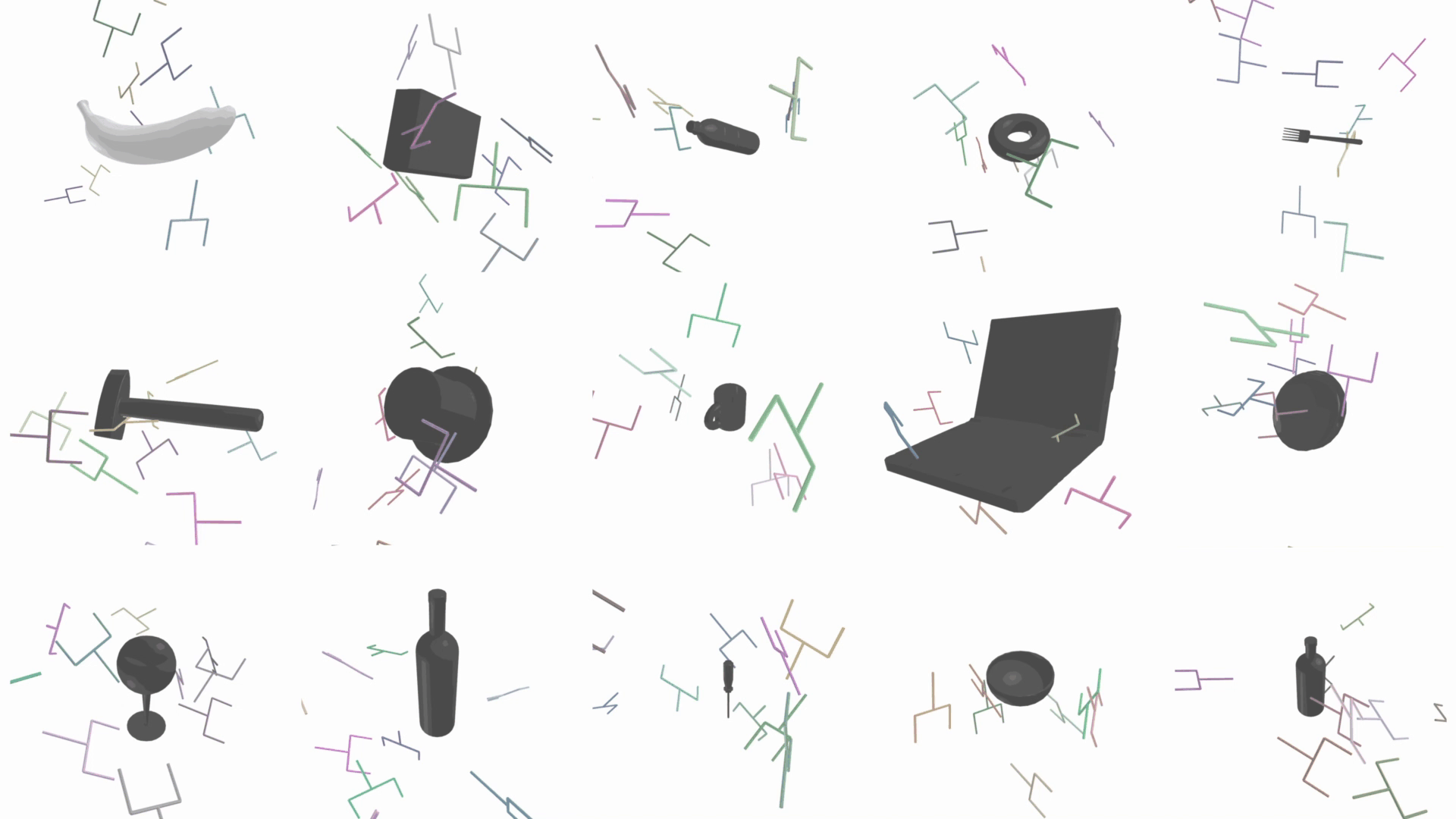This library provides the tools for training and sampling diffusion models in SE(3), implemented in PyTorch. We apply them to learn 6D grasp distributions. We use the learned distribution as cost function for grasp and motion optimization problems. See reference [1] for additional details.
Create a conda environment
conda env create -f environment.ymlActivate the environment and install the library
conda activate se3dif_env && pip install -e .Clone https://github.com/TheCamusean/mesh_to_sdf and install
pip install -e .pip install theseus-ainot working. I suggest trying to install Theseus from source https://github.com/AI-App/Theseus
We define the source of the dataset and trained models in se3dif/utils/directory_utils.py
Originally, the data root folder is set in the folder in which the repository is (one folder before the repository).
Nevertheless, you can change it by changing root_directory in se3dif/utils/directory_utils.py.
root
└─── data
│ │ grasps
│ │ meshes
│ │ sdf
│ └─── models
│ │ │ graspdif_model_0
│ │ │ graspdif_model_1
│
└─── grasp_diffusion (repository)
We provide indications on how to prepare the training
dataset in scripts/create_data.
The already prepared data can be downloaded by
cd ..
and download data.
In the base folder of the repository
cd .. && mkdir data
cd data
sudo apt-get install git-lfs
git lfs install
git clone https://huggingface.co/camusean/grasp_diffusion modelsSample given the whole object pointcloud
python scripts/sample/generate_pointcloud_6d_grasp_poses.py --n_grasps 10 --obj_id 0 --obj_class 'ScrewDriver'
Sample given a mug-specialized model
python scripts/sample/generate_pointcloud_6d_grasp_poses.py --n_grasps 10 --obj_id 10 --obj_class 'Mug' --model 'grasp_dif_mugs'
Sample given a partial pointcloud
python scripts/sample/generate_partial_pointcloud_6d_grasp_poses.py --n_grasps 10 --obj_id 12 --obj_class 'Mug'
Train pointcloud conditioned model
python scripts/train/train_pointcloud_6d_grasp_diffusion.py
Train partial pointcloud conditioned model
python scripts/train/train_partial_pointcloud_6d_grasp_diffusion.py
To evaluate a trained model in Isaac Gym, you first have to install the simulator and install it into your conda environment. Note: for our experiments, we used Isaac Gym preview3.
In the file scripts/evaluate/evaluate_pointcloud_6d_grasp_poses.py we showcase how we evaluate the quality of the trained model
python scripts/evaluate/evaluate_pointcloud_6d_grasp_poses.py --n_grasps 100 --obj_id 0 --obj_class 'Mug' --model 'grasp_dif_mugs' --device "cuda:0"
[1] Julen Urain*, Niklas Funk*, Jan Peters, Georgia Chalvatzaki. "SE(3)-DiffusionFields: Learning smooth cost functions for joint grasp and motion optimization through diffusion" ICRA 2023. [arxiv]
@article{urain2022se3dif,
title={SE(3)-DiffusionFields: Learning smooth cost functions for joint grasp and motion optimization through diffusion},
author={Urain, Julen and Funk, Niklas and Peters, Jan and Chalvatzaki, Georgia},
journal={IEEE International Conference on Robotics and Automation (ICRA)},
year={2023}
[2] Eppner Clemens, Arsalan Mousavian, Dieter Fox. "Acronym: A large-scale grasp dataset based on simulation." IEEE International Conference on Robotics and Automation (ICRA). 2021 [arxiv]
[3] Chang Angel X., et al. "Shapenet: An information-rich 3d model repository." arXiv preprint arXiv:1512.03012. 2015 [arxiv]
This code repository is the joint effort of Julen Urain and Niklas Funk.
If you have any questions or find any bugs, please let me know: Julen Urain julen[at]robot-learning[dot]de
